Ten Questions for Daniel Abraham
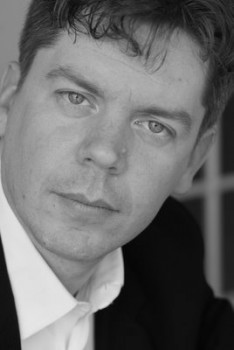
Daniel Abraham and I met at the Millenium PhilCon, my first ever WorldCon. I noted that he had “Albuquerque, New Mexico” under his name on his badge, so I let him know that I was from Los Alamos, and then a few caffeine fueled day/night cycles later, I found myself invited to join his writers group. I’m very glad I did. Like me, Daniel is a Clarion West graduate, though we attended different years. He is the only person, that I know of, who has had his wedding picture in Locus with a toilet prominently displayed in the foreground. That was a gift from said writers group.
I still remember the email Daniel sent when he landed his first novel deal, a four book series with Tor. I was there when he workshopped his first Jayne Heller book, for which he adopted the pen name MLN Hanover, and I was the person he and Ty Franck, the other half of the duo who writes as James SA Corey, knew in common. Ty came to New Mexico for a visit and inevitably met the rest of the writers group, which he would later join.
In the following email interview, I got a chance to catch up with Daniel and revisit some of the stories he’s told me over the years.
An Interview with Daniel Abraham, aka M.L.N. Hanover, aka James S.A. Corey
Conducted and Edited by Emily Mah, November, 2011
Emily Mah: I always think of the story of how you became a writer as beginning pre-natally, when your mother dreamed of you becoming an architect. Care to share what followed from this?
Daniel Abraham: Well the short form of the story is that my mother wanted to be an architect from the time that she was 12, only this was the 60s. When she got pregnant with yours truly, her first thought was “Oh well, maybe I’ll have a son and he’ll be an architect.” Her second thought was something like “Ohmigod, did I just think that?” What followed from that was that I spent my gentle formative years with my Spanish-fluent hippie English major father while my mother got her architectural degree. He read to me a lot all through my childhood, and apparently some of it stuck.
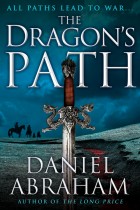 I know you’ve got fond memories of having science fiction stories read to you and then reading them yourself once you were able. Can you relate some memories that really stand out to you?
I know you’ve got fond memories of having science fiction stories read to you and then reading them yourself once you were able. Can you relate some memories that really stand out to you?
I remember the first science fiction story that blew off the top of my head. Once again, my father gets the credit and blame. I was on the porch swing of the house we lived in between the time I was 7 and 12, so let’s call it 9 or 10 years old. My father had picked up an old green library-binding copy of Arthur Clarke’s The Other Side of the Sky. I got to the end of The Nine Billion Names of God, and sat there slack-jawed afterward. It lit my brain up like a Christmas tree. I still have that book on my shelf.
In high school, if I recall this correctly, you joined a mentorship program that was run through the Albuquerque Public Schools, and you said you wanted to be a writer. Can you share what happened next?
It turned out that Fred Saberhagen’s kid had been through the mentorship program too, and he felt like it was the right thing to do to give back to the community. Meaning, in this case, me. I wasn’t the only one. Two of my other friends went to work with him too, but mine was the better experience. Every Saturday for a school year, my mother would drive me up to Fred’s house, and I’d go show him what I was writing. He’d tell me what I was doing wrong, and I’d go back and try again. It was brilliant.
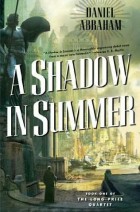 Your first short story about Otah, The Lesson Half-Learned, which was later expanded into the Long Price Quartet, was written right up against a deadline at Clarion West. What were the instructions you decided to follow to get it rolling?
Your first short story about Otah, The Lesson Half-Learned, which was later expanded into the Long Price Quartet, was written right up against a deadline at Clarion West. What were the instructions you decided to follow to get it rolling?
Specifically, it was Sunday night, I was signed up to turn in a story on Tuesday morning, and I didn’t have any idea at all what I was going to write. Not a hint. Nothing. And one of the things that sometimes works is grab a bunch of obstacles, mush them together and see what happens. Connie Willis was our teacher that week, and she was trying to get us to grok hooks and immediacy (which I sometimes still struggle with). She told us to start with someone getting hit in the head. I also had a vague idea about the neutral angels in Dante who didn’t take either side of the war in Heaven and the idea of ritualized poses as a secondary form of communication that I’d lifted from a Walter Jon Williams short story. What came out — basically — was the prologue of the Long Price Quartet books.
Clarion West seems to be when you started to sell short stories. I remember you told me that when you were there, you broke Asimov’s rule against multiple submissions and sent in two Clarion West stories, and that when you got home, you had a letter from Gardner Dozois offering to buy both of them.
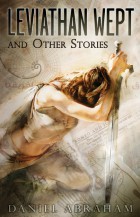 I’d sold two stories before that to semi-pro markets. Ann Kennedy bought a story called Mixing Rebecca for The Silver Web back before she was Ann VanderMeer, and Warren Lapine bought one called Veritas for Absolute Magnitude. They were the stories I used for my submission to Clarion West.
I’d sold two stories before that to semi-pro markets. Ann Kennedy bought a story called Mixing Rebecca for The Silver Web back before she was Ann VanderMeer, and Warren Lapine bought one called Veritas for Absolute Magnitude. They were the stories I used for my submission to Clarion West.
Which teachers did you have there? Have you kept in touch with any of them?
The teachers my year were Paul Park, George RR Martin, Connie Willis, Lucy Sussex, Gardner Dozois, and Carol Emshwiller. Of them, I’m most often in contact with George. He live nearby, I’m working with Ty [Franck, the other half of James S.A. Corey] who spends his days running heard on the industry that is A Song of Ice and Fire, and I’m turning Game of Thrones into comic book scripts, so he pretty much can’t avoid me. I also see Connie and Gardner at conventions or when Connie comes through town and a bunch of us get together for dinner. I haven’t really seen Paul Park, Lucy Sussex, or Carol Emshwiller much in these past few years, though I think of them fondly and often.
What are some things the workshop taught you that helped you get published?
If I had to say the one thing that I took away from the workshop that made the biggest difference in my writing, it’s something we called the Park Test. [Interviewer’s Note: The Park Test involves Paul Park going around the circle of attendees and asking, “What happened in this story?” If you get the same answer all the way around the table, you have passed the Park Test. Many stories fail.] The first story I had up for critique was a surrealist horror story that I write first week. I was fairly proud of it. It had a good voice and some really good creepy bits. I remember that a lot of the folks responded to it pretty well. Paul Park started the critique by asking people to raise their hands if they felt like they knew what happened in the story. I got one or two tentative hands up. We spent a lot of time on clarity that summer. A lot.
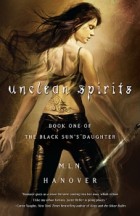 Since your first novel sale, you’ve also done work under some pen names. What inspired you to begin your work as M.L.N. Hanover?
Since your first novel sale, you’ve also done work under some pen names. What inspired you to begin your work as M.L.N. Hanover?There are a couple answers to that. I’ve been interested in urban fantasy since before the category existed. I was reading Laurel K. Hamilton back when Anita Blake was a sexually conflicted Catholic girl. And when the opportunity arose play in that sandbox, I had a bunch of things I wanted to try out.
I did it under pseudonym because the Black Sun’s Daughter books are very, very different from the other books I was getting known for, and I didn’t want to set people’s expectations incorrectly. If you’ve read a few Daniel Abraham books, you kind of know what they are. MLN Hanover books have a different voice and style. Having a different name signals that. At least that’s the hop
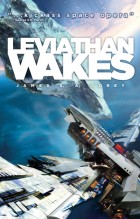 What attracted you to the world of Leviathan Wakes and the decision to team up with Ty Franck as James S.A. Corey?
What attracted you to the world of Leviathan Wakes and the decision to team up with Ty Franck as James S.A. Corey?
I was playing in Ty’s role playing game set in that universe, and the depth of worldbuilding he’d done was amazing. It was great. It was the kind of thing where I could ask him anything, and he’d know the answer. We wound up in this situation where my cop character was trying to figure out how to create a new currency after a governmental collapse by buying old debt that wouldn’t be honored for credits in the new economy. If you know me, that’s the kind of thing that’s turns my crank. Originally, I pictured the partnership as being me writing and Ty telling me how the world worked. He wasn’t up for that, though, and we’ve split the writing right down the middle for the whole thing, and it’s come together awfully well. [Interviewer’s Note: If you think this can happen to you, having an author be so impressed by your RPG that he wants to team up with you to write a novel series, let me adjust your expectations now. It won’t happen. Ty Franck is from an alternate universe where luck runs by different rules. You’ll learn more about that in my next interview of him.]
Looking at one of your older publicity pictures here, what’s with the accordion?  [Note: sorry it’s so small. We looked high and low for a bigger version! It’s hard to see Daniel’s mournful, almost hopeless gaze.]
[Note: sorry it’s so small. We looked high and low for a bigger version! It’s hard to see Daniel’s mournful, almost hopeless gaze.]
Accordions are cool.
[…] root cause of the Expanse series, Emily Mah, has done a nice interview with Daniel over at Black Gate. She asks questions most other people don’t think to ask, so her interviews tend to be […]